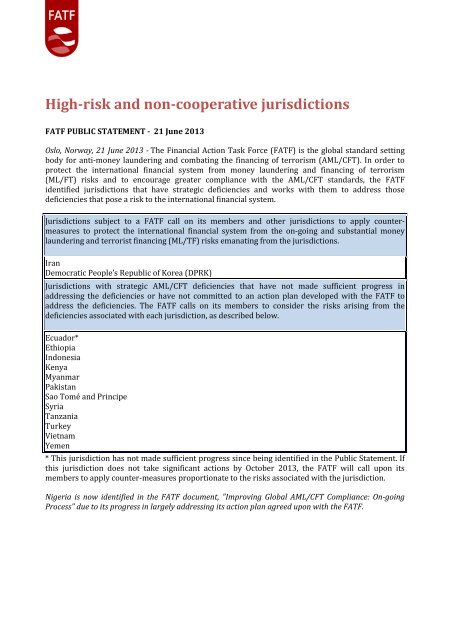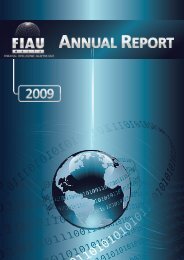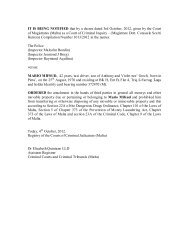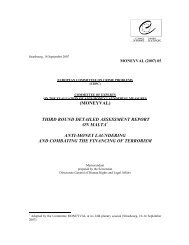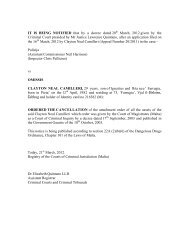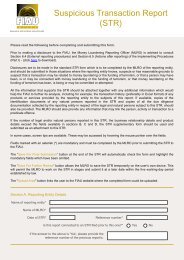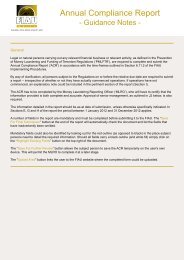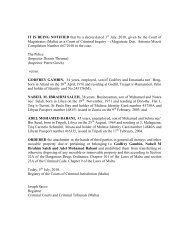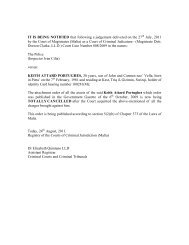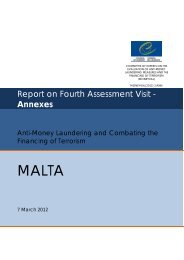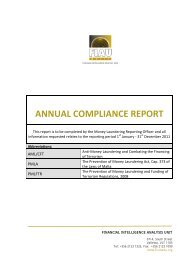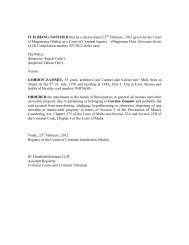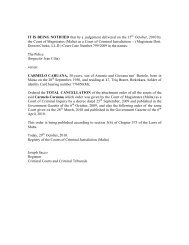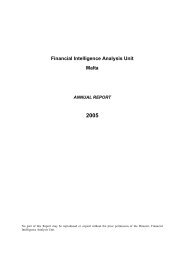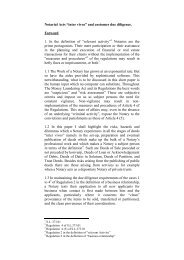FATF Public Statement
FATF Public Statement
FATF Public Statement
Create successful ePaper yourself
Turn your PDF publications into a flip-book with our unique Google optimized e-Paper software.
High-risk and non-cooperative jurisdictions<br />
<strong>FATF</strong> PUBLIC STATEMENT - 21 June 2013<br />
Oslo, Norway, 21 June 2013 - The Financial Action Task Force (<strong>FATF</strong>) is the global standard setting<br />
body for anti-money laundering and combating the financing of terrorism (AML/CFT). In order to<br />
protect the international financial system from money laundering and financing of terrorism<br />
(ML/FT) risks and to encourage greater compliance with the AML/CFT standards, the <strong>FATF</strong><br />
identified jurisdictions that have strategic deficiencies and works with them to address those<br />
deficiencies that pose a risk to the international financial system.<br />
Jurisdictions subject to a <strong>FATF</strong> call on its members and other jurisdictions to apply countermeasures<br />
to protect the international financial system from the on-going and substantial money<br />
laundering and terrorist financing (ML/TF) risks emanating from the jurisdictions.<br />
Iran<br />
Democratic People’s Republic of Korea (DPRK)<br />
Jurisdictions with strategic AML/CFT deficiencies that have not made sufficient progress in<br />
addressing the deficiencies or have not committed to an action plan developed with the <strong>FATF</strong> to<br />
address the deficiencies. The <strong>FATF</strong> calls on its members to consider the risks arising from the<br />
deficiencies associated with each jurisdiction, as described below.<br />
Ecuador*<br />
Ethiopia<br />
Indonesia<br />
Kenya<br />
Myanmar<br />
Pakistan<br />
Sao Tomé and Principe<br />
Syria<br />
Tanzania<br />
Turkey<br />
Vietnam<br />
Yemen<br />
* This jurisdiction has not made sufficient progress since being identified in the <strong>Public</strong> <strong>Statement</strong>. If<br />
this jurisdiction does not take significant actions by October 2013, the <strong>FATF</strong> will call upon its<br />
members to apply counter-measures proportionate to the risks associated with the jurisdiction.<br />
Nigeria is now identified in the <strong>FATF</strong> document, "Improving Global AML/CFT Compliance: On-going<br />
Process" due to its progress in largely addressing its action plan agreed upon with the <strong>FATF</strong>.
Iran<br />
2<br />
<strong>Public</strong> <strong>Statement</strong> - 21 June 2013<br />
The <strong>FATF</strong> remains particularly and exceptionally concerned about Iran’s failure to address the risk<br />
of terrorist financing and the serious threat this poses to the integrity of the international financial<br />
system, despite Iran’s previous engagement with the <strong>FATF</strong> and recent submission of information.<br />
The <strong>FATF</strong> reaffirms its call on members and urges all jurisdictions to advise their financial<br />
institutions to give special attention to business relationships and transactions with Iran, including<br />
Iranian companies and financial institutions. In addition to enhanced scrutiny, the <strong>FATF</strong> reaffirms its<br />
25 February 2009 call on its members and urges all jurisdictions to apply effective counter-measures<br />
to protect their financial sectors from money laundering and financing of terrorism (ML/FT) risks<br />
emanating from Iran. <strong>FATF</strong> continues to urge jurisdictions to protect against correspondent<br />
relationships being used to bypass or evade counter-measures and risk mitigation practices and to<br />
take into account ML/FT risks when considering requests by Iranian financial institutions to open<br />
branches and subsidiaries in their jurisdiction. Due to the continuing terrorist financing threat<br />
emanating from Iran, jurisdictions should consider the steps already taken and possible additional<br />
safeguards or strengthen existing ones.<br />
The <strong>FATF</strong> urges Iran to immediately and meaningfully address its AML/CFT deficiencies, in<br />
particular by criminalising terrorist financing and effectively implementing suspicious transaction<br />
reporting (STR) requirements. If Iran fails to take concrete steps to continue to improve its CFT<br />
regime, the <strong>FATF</strong> will consider calling on its members and urging all jurisdictions to strengthen<br />
counter-measures in October 2013.<br />
Democratic People's Republic of Korea (DPRK)<br />
Since February 2013, the DPRK has continued to engage directly with the <strong>FATF</strong> and has engaged<br />
further with the APG. The <strong>FATF</strong> urges the DPRK to enhance its engagement with these bodies to<br />
agree with the <strong>FATF</strong> on an action plan to address its AML/CFT deficiencies.<br />
The <strong>FATF</strong> remains concerned by the DPRK’s failure to address the significant deficiencies in its antimoney<br />
laundering and combating the financing of terrorism (AML/CFT) regime and the serious<br />
threat this poses to the integrity of the international financial system. The <strong>FATF</strong> urges the DPRK to<br />
immediately and meaningfully address its AML/CFT deficiencies.<br />
The <strong>FATF</strong> reaffirms its 25 February 2011 call on its members and urges all jurisdictions to advise<br />
their financial institutions to give special attention to business relationships and transactions with<br />
the DPRK, including DPRK companies and financial institutions. In addition to enhanced scrutiny, the<br />
<strong>FATF</strong> further calls on its members and urges all jurisdictions to apply effective counter-measures to<br />
protect their financial sectors from money laundering and financing of terrorism (ML/FT) risks<br />
emanating from the DPRK. Jurisdictions should also protect against correspondent relationships<br />
being used to bypass or evade counter-measures and risk mitigation practices, and take into account<br />
ML/FT risks when considering requests by DPRK financial institutions to open branches and<br />
subsidiaries in their jurisdiction.
Ecuador*<br />
3<br />
<strong>Public</strong> <strong>Statement</strong> - 21 June 2013<br />
Despite Ecuador’s high-level political commitment to work with the <strong>FATF</strong> and GAFISUD to address<br />
its strategic AML/CFT deficiencies, Ecuador has not made sufficient progress in implementing its<br />
action plan within the established timelines, and certain strategic deficiencies remain. The <strong>FATF</strong><br />
acknowledges the commitment from the President of Ecuador’s National Assembly to enact<br />
improvements to its CFT provisions by September 2013. Ecuador should continue to work with the<br />
<strong>FATF</strong> and GAFISUD on implementing its action plan to address these deficiencies, including by: (1)<br />
ensuring adequate criminalisation of terrorist financing; (2) establishing and implementing<br />
adequate procedures to identify and freeze terrorist assets; (3) implementing adequate procedures<br />
for the confiscation of funds related to money laundering; and (4) continuing to enhance coordination<br />
of financial sector supervision. Taking into account Ecuador’s continued lack of progress<br />
in these areas, if Ecuador does not take significant actions by October 2013, the <strong>FATF</strong> will call upon<br />
its members to apply counter-measures proportionate to the risks associated with Ecuador.<br />
Ethiopia<br />
Ethiopia has taken steps towards improving its AML/CFT regime, including by adequately<br />
criminalising money laundering and terrorist financing through the AML/CFT law enacted in<br />
January 2013. However, despite Ethiopia’s high-level political commitment to work with the <strong>FATF</strong> to<br />
address its strategic AML/CFT deficiencies, Ethiopia has not made sufficient progress in<br />
implementing its action plan within the agreed timelines, and certain strategic AML/CFT deficiencies<br />
remain. Ethiopia should continue to work on implementing its action plan to address these<br />
deficiencies, including by: (1) establishing and implementing an adequate legal framework and<br />
procedures to identify and freeze terrorist assets; and (2) implementing effective, proportionate and<br />
dissuasive sanctions in order to deal with natural or legal persons that do not comply with the<br />
national AML/CFT requirements. The <strong>FATF</strong> encourages Ethiopia to address its remaining<br />
deficiencies and continue the process of implementing its action plan.<br />
Indonesia<br />
Indonesia has taken steps towards improving its AML/CFT regime, including by adequately<br />
criminalising terrorist financing through the CFT law enacted in February 2013. However, despite<br />
Indonesia’s high-level political commitment to work with the <strong>FATF</strong> and APG to address its strategic<br />
AML/CFT deficiencies, Indonesia has not made sufficient progress in implementing its action plan<br />
within the agreed timelines, and certain strategic AML/CFT deficiencies remain regarding the<br />
establishment and implementation of an adequate legal framework and procedures for identifying<br />
and freezing of terrorist assets. The <strong>FATF</strong> encourages Indonesia to address these remaining issues, in<br />
compliance with international standards.
Kenya<br />
4<br />
<strong>Public</strong> <strong>Statement</strong> - 21 June 2013<br />
Kenya has taken steps towards improving its AML/CFT regime, including the issuance of AML<br />
regulations and the Money Remittance Regulations, which address deficiencies regarding preventive<br />
measures and supervision. However, despite Kenya’s high-level political commitment to work with<br />
the <strong>FATF</strong> and ESAAMLG to address its strategic AML/CFT deficiencies, Kenya has not made sufficient<br />
progress in implementing its action plan within the agreed timelines, and certain strategic AML/CFT<br />
deficiencies remain. Kenya should continue to work on implementing its action plan to address these<br />
deficiencies, including by: (1) adequately criminalising terrorist financing; (2) ensuring a fully<br />
operational and effectively functioning Financial Intelligence Unit; (3) establishing and<br />
implementing an adequate legal framework for the identification and freezing of terrorist assets; and<br />
(4) implementing an adequate and effective AML/CFT supervisory programme for all financial<br />
sectors. The <strong>FATF</strong> encourages Kenya to address its remaining deficiencies and continue the process<br />
of implementing its action plan.<br />
Myanmar<br />
Myanmar has taken steps towards improving its AML/CFT regime. However, despite Myanmar’s<br />
high-level political commitment to work with the <strong>FATF</strong> and APG to address its strategic AML/CFT<br />
deficiencies, Myanmar has not made sufficient progress in implementing its action plan, and certain<br />
strategic AML/CFT deficiencies remain. Myanmar should continue to work on implementing its<br />
action plan to address these deficiencies, including by: (1) adequately criminalising terrorist<br />
financing; (2) establishing and implementing adequate procedures to identify and freeze terrorist<br />
assets; (3) further strengthening the extradition framework in relation to terrorist financing;<br />
(4) ensuring a fully operational and effectively functioning Financial Intelligence Unit; (5) enhancing<br />
financial transparency; and (6) strengthening customer due diligence measures. The <strong>FATF</strong><br />
encourages Myanmar to address the remaining deficiencies and continue the process of<br />
implementing its action plan.<br />
Pakistan<br />
Pakistan has taken significant steps towards improving its AML/CFT regime, including by amending<br />
its Anti-Terrorism Act to criminalise terrorist financing largely consistent with the international<br />
standards. However, despite Pakistan’s high-level political commitment to work with the <strong>FATF</strong> and<br />
APG to address its strategic AML/CFT deficiencies, Pakistan has not yet made sufficient progress in<br />
fully implementing its action plan, and certain key CFT deficiencies remain. Pakistan needs to take<br />
additional steps to meet the international standards regarding the identification and freezing of<br />
terrorist assets, including by further amending its Anti-Terrorism Act. The <strong>FATF</strong> encourages<br />
Pakistan to address the remaining deficiencies and continue the process of implementing its action<br />
plan.
São Tomé and Príncipe<br />
5<br />
<strong>Public</strong> <strong>Statement</strong> - 21 June 2013<br />
Despite São Tomé and Príncipe’s high-level political commitment to work with the <strong>FATF</strong> and GIABA<br />
to address its strategic AML/CFT deficiencies, São Tomé and Príncipe has not made sufficient<br />
progress in implementing its action plan, and certain strategic deficiencies remain. São Tomé and<br />
Príncipe should continue to work on implementing its action plan to address these deficiencies,<br />
including by: (1) adequately criminalising money laundering and terrorist financing; (2) establishing<br />
a fully operational and effectively functioning Financial Intelligence Unit; (3) ensuring that financial<br />
institutions and DNFBPs are subject to adequate AML/CFT regulation and supervision; and<br />
(4) implementing effective, proportionate and dissuasive sanctions in order to deal with natural or<br />
legal persons that do not comply with the national AML/CFT requirements. The <strong>FATF</strong> encourages<br />
São Tomé and Príncipe to address its remaining deficiencies and continue the process of<br />
implementing its action plan.<br />
Syria<br />
Despite Syria’s high-level political commitment to work with the <strong>FATF</strong> and MENA<strong>FATF</strong> to address its<br />
strategic AML/CFT deficiencies, Syria has not made sufficient progress in implementing its action<br />
plan, and certain strategic AML/CFT deficiencies remain. Syria should continue to work on<br />
implementing its action plan to address these deficiencies, including by: (1) providing sufficient legal<br />
basis for implementing the obligations under UNSCR 1373 and implementing adequate procedures<br />
for identifying and freezing terrorist assets; and (2) ensuring that appropriate laws and procedures<br />
are in place to provide mutual legal assistance. The <strong>FATF</strong> encourages Syria to address its remaining<br />
deficiencies and continue the process of implementing its action plan.<br />
Tanzania<br />
Tanzania has taken steps towards improving its AML/CFT regime. However, despite Tanzania’s highlevel<br />
political commitment to work with the <strong>FATF</strong> and ESAAMLG to address its strategic AML/CFT<br />
deficiencies, Tanzania has not made sufficient progress in implementing its action plan within the<br />
agreed timelines, and certain strategic CFT deficiencies remain regarding the establishment and<br />
implementation of adequate procedures to identify and freeze terrorist assets. The <strong>FATF</strong> encourages<br />
Tanzania to address this remaining deficiency and continue the process of implementing its action<br />
plan.<br />
Turkey<br />
Turkey has taken notable steps towards improving its CFT regime, including by enacting a terrorist<br />
financing law in February 2013 and issuing the regulation to implement this law in May 2013. The<br />
<strong>FATF</strong> welcomes these steps made by Turkey, which improve the country’s compliance with<br />
international standards. However, the <strong>FATF</strong> has not assessed the regulation due to its very recent<br />
nature and therefore the <strong>FATF</strong> has not yet determined the extent to which it addresses the on-going<br />
shortcomings in the Turkish counter-terrorist financing regime. Turkey should clarify the remaining
6<br />
<strong>Public</strong> <strong>Statement</strong> - 21 June 2013<br />
concerns in order to ensure that it reaches a satisfactory level of compliance with the international<br />
standards. The <strong>FATF</strong> encourages Turkey to address the remaining deficiencies and continue the<br />
process of implementing its action plan.<br />
Vietnam<br />
Vietnam has taken steps towards improving its AML/CFT regime, including passage of its counterterrorism<br />
legislation. However, despite Vietnam’s high-level political commitment to work with the<br />
<strong>FATF</strong> and APG to address its strategic AML/CFT deficiencies, Vietnam has not made sufficient<br />
progress in implementing its action plan, and certain strategic AML/CFT deficiencies remain.<br />
Vietnam should continue to work with the <strong>FATF</strong> and APG on implementing its action plan to address<br />
these deficiencies, including by: (1) establishing and implementing adequate procedures to identify<br />
and freeze terrorist assets; (2) making legal persons subject to criminal liability in line with<br />
international standards; and (3) strengthening international co-operation. The <strong>FATF</strong> urges Vietnam<br />
to address its remaining deficiencies and continue the process of implementing its action plan.<br />
Yemen<br />
Despite Yemen’s high-level political commitment to work with the <strong>FATF</strong> and MENA<strong>FATF</strong> to address<br />
its strategic AML/CFT deficiencies, Yemen has not made sufficient progress in implementing its<br />
action plan and certain strategic AML/CFT deficiencies remain. Yemen should continue to work on<br />
implementing its action plan to address these deficiencies, including by: (1) adequately criminalising<br />
money laundering and terrorist financing; (2) establishing and implementing adequate procedures<br />
to identify and freeze terrorist assets; (3) developing the monitoring and supervisory capacity of the<br />
financial sector supervisory authorities and the Financial Intelligence Unit (FIU) to ensure<br />
compliance by financial institutions with their suspicious transaction reporting obligations,<br />
especially in relation to the financing of terrorism; and (4) ensuring a fully operational and<br />
effectively functioning FIU. The <strong>FATF</strong> urges Yemen to address its remaining deficiencies and<br />
continue the process of implementing its action plan.


